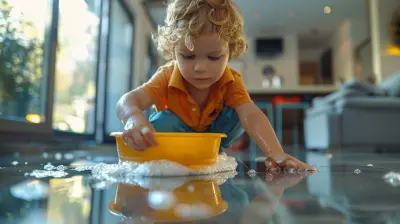4 April 2025
Parenting—it's a job with no days off, no manual, and definitely no refund policy. One of the biggest debates in this wild ride we call parenthood is how much involvement is too much and how much is just right when it comes to our kids’ education and behavior. Spoiler alert: Being an engaged parent isn’t just helpful—it’s game-changing.
From boosting grades to shaping behavior that doesn’t make teachers pull their hair out, parental involvement plays a make-or-break role in a child’s development. But let’s be real—between packing lunches, managing tantrums, and attempting (poorly) to help with algebra, how much does our involvement really matter? Let’s break it down.

Why Parental Involvement Matters More Than You Think
Ever heard the phrase "It takes a village to raise a child"? Well, that village includes you, dear parent. From the moment your little one starts scribbling on walls to the day they’re deciphering Shakespeare, your presence in their academic journey makes all the difference.1. Academic Superpowers: Parents = Secret Tutors
No, you don’t have to be a math genius (thank you, Google) to have an impact on your child's education. Studies show that kids perform better academically when parents are involved—whether it’s helping with homework, attending parent-teacher meetings, or simply asking, "Hey, what did you learn today?"- Better Grades: When parents are engaged, kids tend to score higher on tests and ace assignments. It’s like having a built-in motivational coach (minus the whistle).
- Stronger Study Habits: A structured learning environment at home creates consistency, making schoolwork feel like less of a chore and more of a natural routine.
- Higher Graduation Rates: Students with involved parents are more likely to stay in school and earn their diplomas. Turns out, nagging can be a good thing.
2. The Behavior Factor: Raising Humans, Not Just Students
Parental involvement doesn’t just boost brainpower—it also molds behavior. Think of it as being the director of your child's personal sitcom: guiding them when they improvise too much and gently redirecting their dramatic tendencies.- Better Social Skills: Engaged parents help kids develop important life skills—like sharing, communicating, and not throwing a tantrum when they lose at Uno.
- Improved Attitude Toward School: Kids whose parents show interest in their education tend to have a more positive attitude toward learning (and fewer "I hate school" meltdowns).
- Reduced Behavioral Problems: The more involved parents are, the less likely their child is to engage in risky behaviors like skipping school, getting into fights, or attempting to set the toaster on fire (we've all been there).

The Different Flavors of Parental Involvement
Parental involvement isn’t a one-size-fits-all deal. It comes in many shapes and forms, and the key is finding what works for you and your child.1. At-Home Support: The Behind-the-Scenes Hero
Even if your schedule doesn’t allow for classroom volunteering, you can still create a strong academic foundation at home.- Help with homework (or pretend to know what you're doing before resorting to YouTube).
- Encourage reading by making books a part of everyday life—bedtime stories, library visits, or just a dramatic reading of cereal box ingredients.
- Set a study schedule that balances work and play (because even Einstein needed a break).
2. School Participation: Showing Up (Even in Pajamas)
Sometimes, just being present can speak volumes. Getting involved at school shows your child that their education matters.- Attend parent-teacher conferences (even if it's just to decode the teacher’s polite way of saying your child is a handful).
- Volunteer for school events—PTA meetings, bake sales, or chaperoning field trips (brace yourself for why is the sky blue? on repeat).
- Engage with teachers—stay updated on your child’s progress and address issues before they escalate.
3. Emotional Support: The Ultimate MVP Move
Beyond grades and homework, kids need emotional backing to thrive academically and behaviorally.- Encourage effort over perfection. Remind them that even Albert Einstein probably had bad test days.
- Be their biggest cheerleader—celebrate wins (big and small), whether it's an A+ or just attempting to clean their room.
- Create a safe space where they feel comfortable discussing both school and personal struggles (because teenage years are a lot).

The Fine Line: Too Much vs. Too Little
While involvement is key, there is such a thing as helicopter parenting. Constantly hovering can backfire, leading to stressed-out kids who feel like they can’t make decisions on their own.On the flip side, being too distant often results in kids struggling academically, lacking discipline, or developing behavioral issues.
So, where’s the middle ground?
- Offer guidance, but let them solve their own problems when possible.
- Be present, but don’t breathe down their necks.
- Encourage independence while making sure they know you’re always there if they need you.

Common Parenting Myths (Busted!)
Let’s debunk some of the biggest myths about parental involvement.Myth #1: Kids Don’t Want Their Parents Involved
Wrong. Even if your teenager rolls their eyes so hard they could see their brain, they still want support. Trust me.Myth #2: Only Parents with Educational Backgrounds Can Help
Nope! You don’t need a teaching degree to be involved. A little encouragement, a structured routine, and a positive attitude go a long way.Myth #3: The School Handles Everything
Schools play a big role, but they can’t do it alone. Education is a team sport, and parents are the MVPs.The Long-Term Benefits (Because Parenting is a Marathon)
Parental involvement isn't just about short-term academic success; it impacts lifelong habits and attitudes.- Confidence Boost: Kids raised in an encouraging environment grow into self-assured adults who tackle challenges head-on.
- Stronger Parent-Child Bond: When education becomes a shared journey, it strengthens your relationship (and makes those teenage years slightly less terrifying).
- Better Decision-Making Skills: Involved parents shape critical thinkers who learn to navigate the world wisely.
Final Thoughts
At the end of the day, parenting is about balance. Your involvement in your child’s academic and behavioral development doesn’t mean micromanaging—it means showing up, cheering them on, and giving them the tools to succeed.So, the next time your kid complains about homework or school projects make you want to cry, remember: your presence and support are shaping their future. And hey, if all else fails, there’s always coffee... and maybe a little bit of chocolate.




Uri Rhodes
Parental involvement positively influences growth.
April 4, 2025 at 4:06 AM